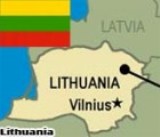Former EU commissioner favourite for Lithuanian presidency
 Vilnius - Lithuanians go to the polls for the third time in less than six months on May 17, and might be called upon to do so again for a double helping on June 7, the same day as the European Parliamentary Elections.
Vilnius - Lithuanians go to the polls for the third time in less than six months on May 17, and might be called upon to do so again for a double helping on June 7, the same day as the European Parliamentary Elections.
Previous votes in October and November 2008 saw a centre-right coalition government take power, but this time the southernmost of the three Baltic states will be deciding who succeeds Valdas Adamkus as president.
The 82-year-old Adamkus is widely respected at home and abroad but has served the maximum of two five-year terms permitted by the Lithuanian constitution.
As well as helping to position Lithuania as a strongly pro-western and Russia-sceptic country, former US citizen Adamkus helped restore credibility to an institution that seemed on the verge of farcical collapse in 2004 when incumbent president (and stunt pilot) Rolandas Paksas became the first European president to be impeached.
Paksas was eventually removed from office for breach of oath in connection with shady business links to Russia.
Seven candidates are fighting for the right to call the Presidential Palace in Vilnius, their home for the next five years.
As well as the impressive residence, the presidency comes with a fair degree of power, making it more than the figurehead role of presidencies in a number of other countries.
The president decides basic issues of foreign policy and is commander-in-chief of the armed forces. Under certain circumstances, the president can also dissolve the Lithuanian parliament, the Seimas, and has a right of veto on legislation - powers which should not be underestimated in the often fractious and populism-prone world of Lithuanian politics.
The clear favourite to become the ninth president (including one acting president in the wake of the Paksas affair) and the first female president is Dalia Grybauskaite, who until recently was the European Union's Financial Planning and Budgets Commissioner.
One of the few respected figures on the Lithuanian political scene, her candidacy has already received backing from Prime Minister Andrius Kubilius.
"I have no doubts about her qualification. She would make a very good president," Kubilius said.
Explaining her decision to quit Brussels, Grybauskaite said she had been affected by watching TV pictures of riots that broke out in Vilnius in January as the effects of a severe economic downturn hit her homeland.
"I can and want to contribute my experience, knowledge and skills to the citizens of Lithuania. Therefore I will be contesting the presidential elections," said Grybauskaite.
Polls suggest Grybauskaite could even cross the 50 per cent of the vote threshold that would make a second run-off election in June unnecessary.
The only thing to dent her campaign has been a persistent rumour that she may be a lesbian. Lithuania, like neighbouring Poland, is a staunchly Catholic country where homosexuality is often frowned upon.
Whispers regarding Grybauskaite's sexuality have been circulating for years, if only because at 52 years old she is unmarried and childless. In an effort to quash the rumour, Grybauskaite used an online question and answer session to issue an explicit denial.
"If you're asking whether I am a lesbian, then no, I am not," she said.
Another woman running for the presidency has also been dogged by rumour. Kazimira Danute Prunskiene served as the first prime minister in reborn Lithuania after it regained its independence from the Soviet Union in 1991, but has been the victim of unproven suggestions that she was a KGB agent. Prunskiene came second to Adamkus in the 2004 election.
The third main contender is Algirdas Butkevicius, a former finance minister who is now chairman of the left wing Social Democratic Party ousted from government last year.
The most recent polls suggest Grybauskaite will have around 53 per cent of the vote, followed by Butkevicius on 9 per cent and Prunskiene on 6 per cent. None of the other candidates, which include a retired army officer and a representative of Lithuania's Polish minority, commands more than 5 per cent.